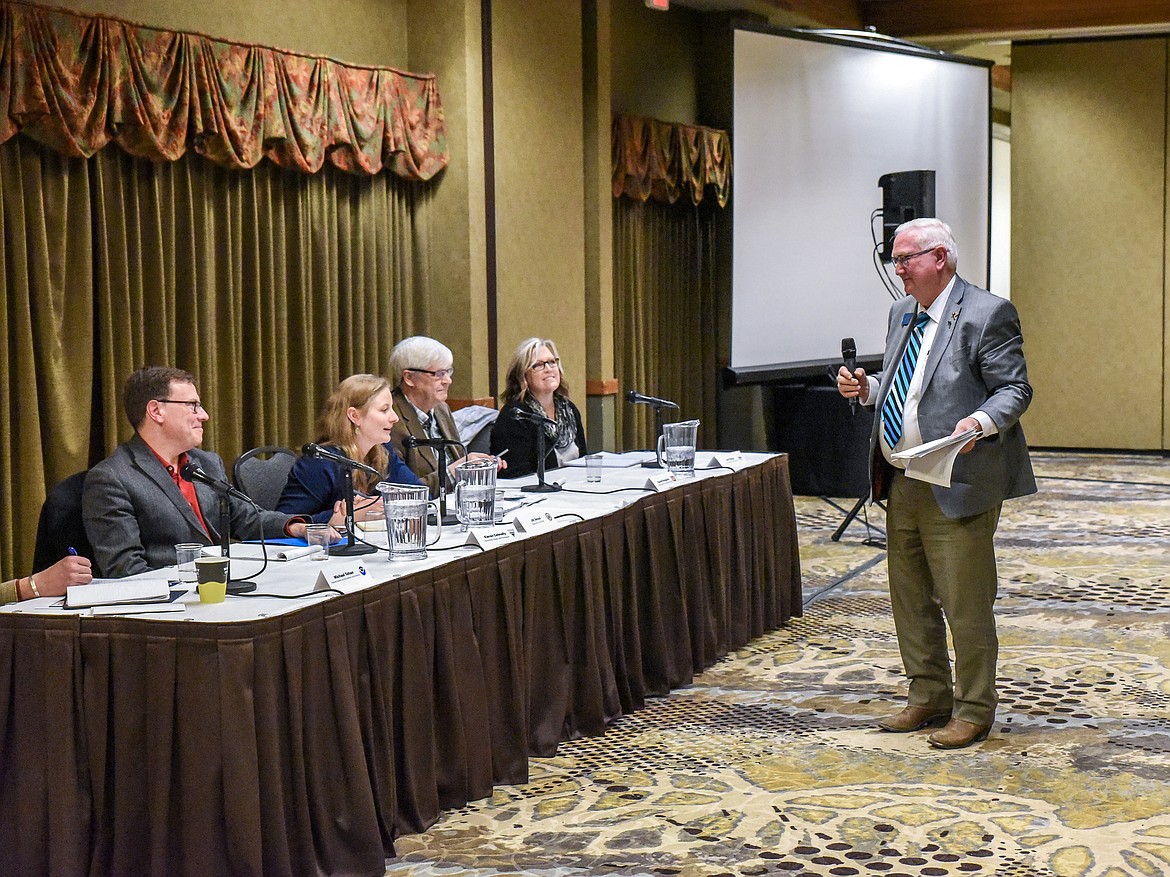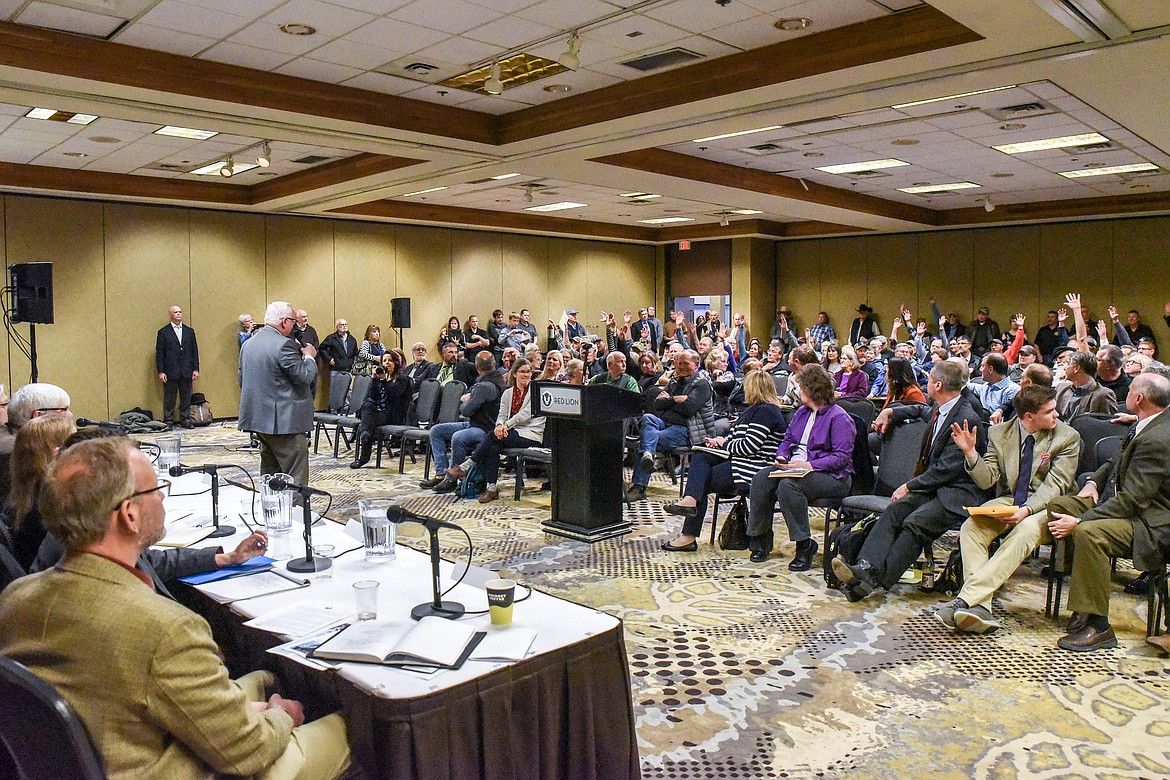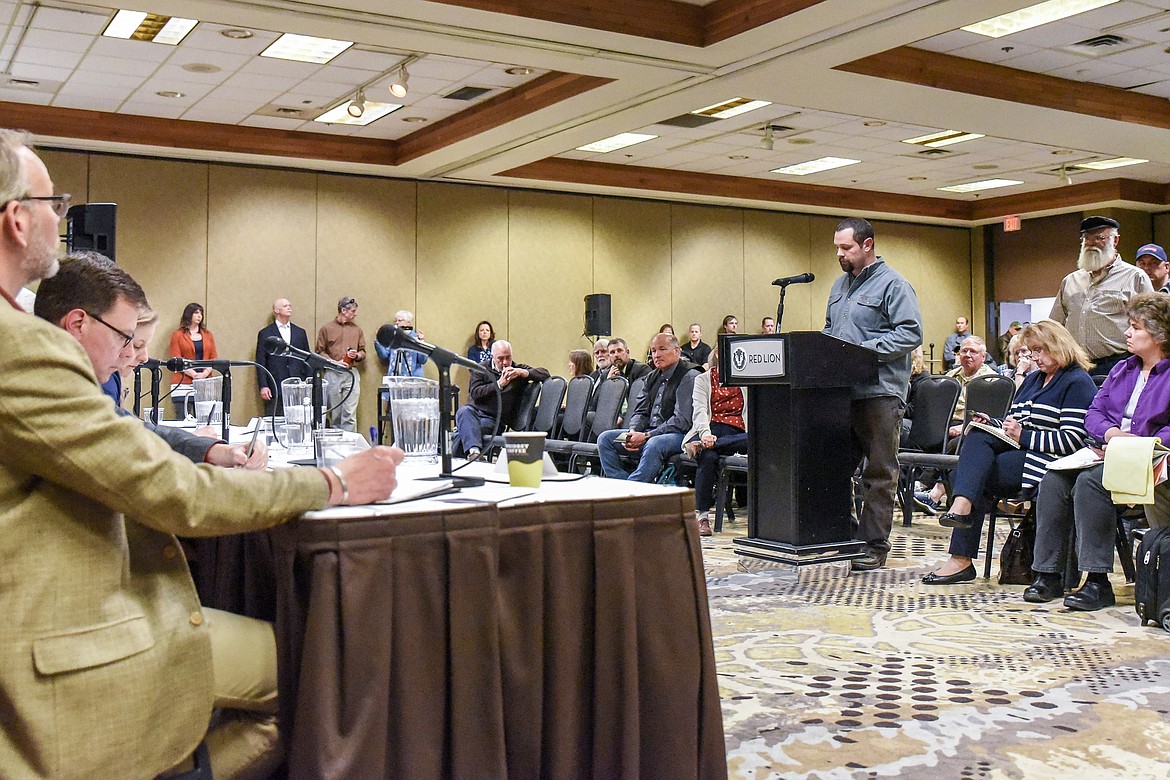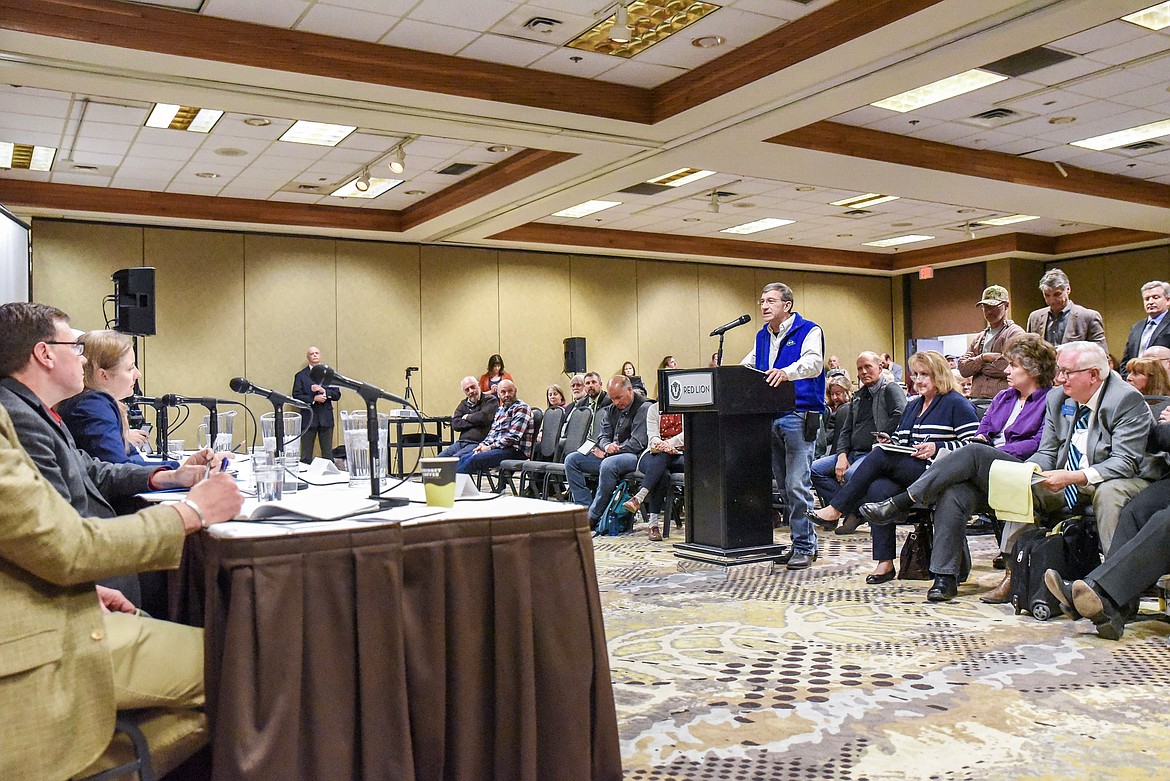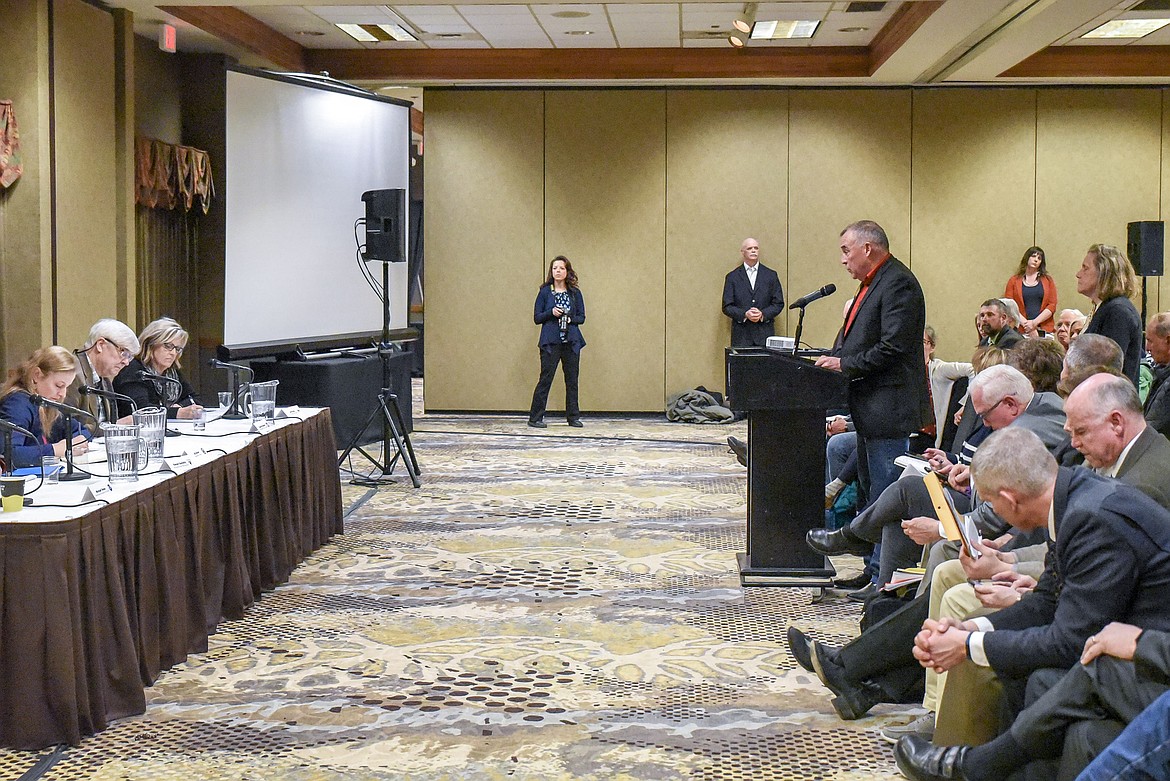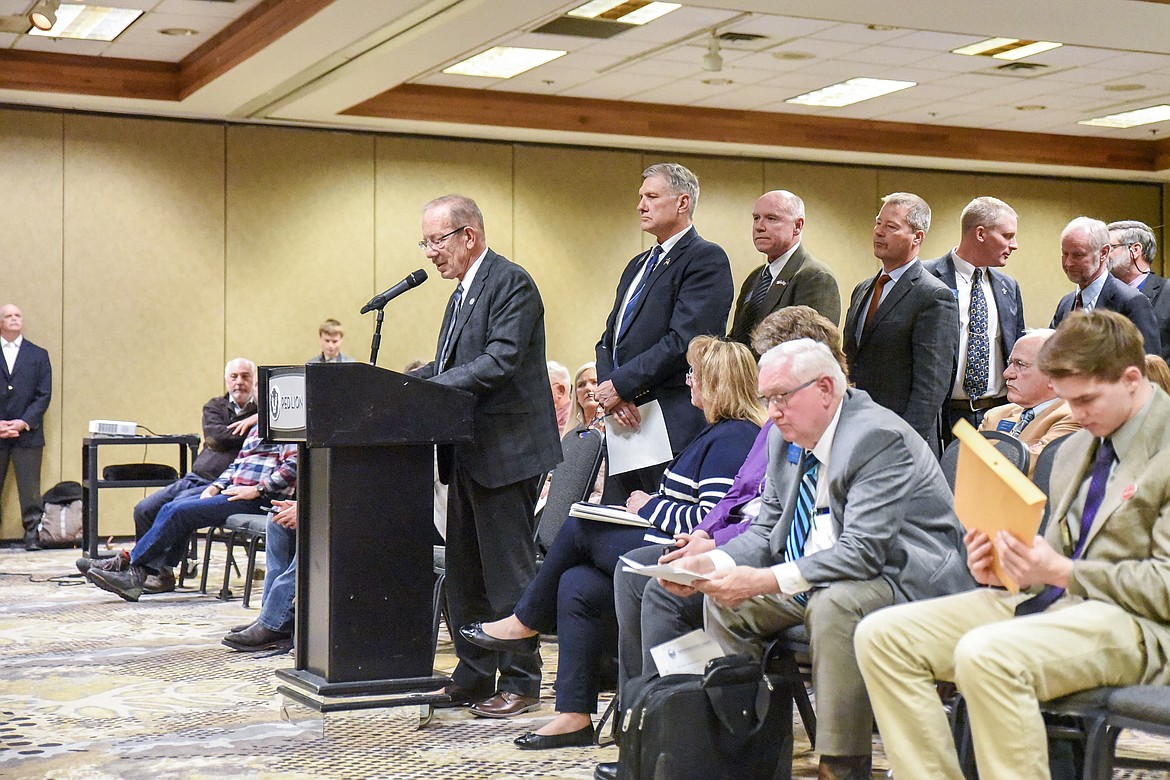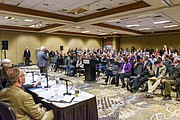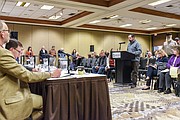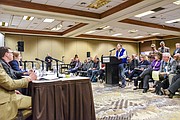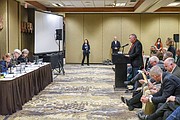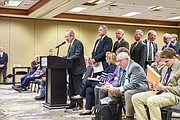'This is the farthest we've been' Town hall draws legislators, County residents by the carload
Lincoln County residents nearly filled the conference room at the Red Lion Hotel in Kalispell — joined by a smattering of other parties from around the Columbia River Basin and a retinue of Montana legislators — for a town hall meeting led by Jill Smail, the U.S. State Department chief negotiator for the Columbia River Treaty with Canada.
Both the Lincoln County residents and the legislators were there following efforts by State Senator Mike Cuffe, District 1, to make sure that the concerns of Lincoln County and Montana as a whole were heard during the town hall.
Cuffe sponsored a resolution that passed both the State Senate and House, with only one dissenting vote in the House. During his remarks, Cuffe quipped, “I think that vote was a little reaction to a vote I had made the day before.”
Montana State Sen. and Majority Whip Doug Kary, District 22, was the first to the podium, with a slew of state legislators lined up behind him. He read a letter from Senate President Scott Sales, District 35, who could not attend the meeting.
“As you work to modernize this agreement, I urge you to amend the treaty to compensate the state of Montana for lost tax revenue due to the construction of Libby Dam,” he read. “Lincoln County has lost millions of dollars in lost property taxes and lost revenues due to the many thousands of acres of county land that are now under Lake Koocanusa.”
Noting that Canada receives compensation for the dams that they built that allow for flood control and power production, the letter from Sales stated that the goal was only to make the treaty equal.
Lincoln County commissioners Jerry Bennett and Josh Letcher also made remarks during the town hall.
Bennett said that he wanted to thank Smail for the time she has given to listening to Lincoln County’s concerns, and he complimented the openness of the process.
“I would also like to just recognize the 50-or-so-plus Lincoln County residents that understand the importance of this treaty and have made their way here tonight, and I know will continue to be involved” he said.
“Thanks, Jerry,” Smail said as Bennett concluded.
As a Eureka resident, Letcher spoke to not only past sacrifices, but the issues the dam creates for current residents as well.
“My family has lived near the Kootenai River for seven generations. The building of the Libby Dam and filling of Lake Koocanusa flooded my family’s lands, both in the United States and Canada,” he said.
Letcher said that some promises never came to fruition, such as boat ramps to foster the tourism economy and low electric rates.
“Our tourism is lacking, and our electricity rates are even with other areas of the country,” Letcher said.
With around 78 percent of the land in Lincoln County under federal management, the 34,000 acres lost under Lake Koocanusa was more than lost property tax revenues, he said. Timber and wildlife habitat was lost forever as well.
But there are current hardships Letcher spoke to, such as dust storms Eureka residents deal with in the late winter and early spring when the water is drawn down for flood control.
Near the end of his statements, Letcher made a reference to the flood control that is provided to other communities, contrasting it to the homes, ranches and farms that now lie at the bottom of Lake Koocanusa.
“We provide flood control for downstream communities, but our communities are still under water,” he said.
In addition to local officials and legislators from around the region, Flathead County Commissioner Randy Brodehl spoke on behalf of the Flathead County Commission in support of Cuffe’s proposed changes to the treaty.
He noted that the legislators who had come to support the changes to the treaty had driven around 200 miles to do so, and would be driving back again that night.
“Please understand that Flathead County stands with our neighbors in Lincoln County, and the Montana State Legislature, requesting that this treaty be amended to address the loss of agricultural land and jobs in Lincoln County, and revenue in our counties and our state,” he said. “We ask that Montana be put on an even playing field with our good neighbors — the Canadians — to the north.”
Key points
By the time that Cuffe stood to speak at the end of the town hall, he did not revisit the changes to the treaty he has spent nearly a decade fighting for, and which were reiterated by Lincoln County residents, legislators and several voices from Flathead County as well.
Benefits for Lincoln County and Montana would be in recognition of the lost potential from the dam — British Columbia currently receives half of the benefit from electric generation due to the dams there — and removal from the treaty of an article that would allow Canada to divert over a quarter — 26 percent — of the flow of the Kootenai River.
Cuffe has said throughout the process that it is unlikely Canada would divert so much water from the Kootenai due to the ecological disaster it would create. However, if Canada has no intention of ever diverting the water from the Kootenai, then they should have no objection to removing that section from the treaty, he said.
Cuffe has also advocated for Lincoln County to get a share of power generation benefit that Libby Dam helps to create.
In 2015, Cuffe — then a state representative — carried a bill in the Montana Legislature anticipating a day when Montana would receive a share of the profits that the Libby Dam helps to create.
Since Libby Dam accounts for around 20 percent of the power generation through the water it controls and releases at a predictable rate, Cuffe said he has sought for Montana to receive 20 percent of what Canada does.
Cuffe noted that 20 percent — which could net Lincoln County between $40 million and $60 million annually — is a starting point to negotiate, and a final figure could be less.
Under the legislation Cuffe carried in 2015, 80 percent of any share coming to Montana from the electric profits would go to Lincoln County for schools, roads and general operations. The state would deposit the other 20 percent into the general fund.
Cuffe said the permitted county uses are meant to mirror the historical uses for timber sale revenues.
The 2015 law also calls for a trust fund to be set up from the money that goes to the county, which would accumulate interest to be spent on things such as infrastructure and environmental cleanup.
Bringing it home
After handing out copies to the panel of the resolution the Montana Legislature passed, Cuffe said, “You don’t know how much this means. We have felt disrespected, left out of the process, ignored.”
Cuffe recalled the people who were displaced when the dam was built, who he had interviewed as a graduate journalism student, “It’s heart-jerking.”
He then had some of the people in the audience from Lincoln County who had lived in the area before the dam was built stand.
Then Cuffe asked first for those from Libby and Troy, and then those from Eureka, to raise their hands.
Aside from the legislators in the first rows, there were only a few in the audience who did not raise a hand.
“So, we have a meeting here in Kalispell, but you can see who came,” he said to the panel. “We’d love to have you in Lincoln County. We’d show you a good time there.”
Cuffe also expressed gratitude to his legislative colleagues who came to the meeting. He said that he had simply asked about taking time away to come to the meeting, “and the next thing I knew, it wasn’t just me coming — we had a bunch of them, and it means a lot.”
After the meeting, Montana House Majority Leader Brad Tschida, District 97, gave credit to Cuffe for his efforts.
“I believe, because of his efforts, we saw the kind of turnout that we did — the kind of passion, the information that was shared,” he said.
Kary said that the local support at the meeting was outstanding.
“I cannot believe how many people came over to the meeting,” he said. “And the people that supported Mike Cuffe and his resolution, I think it was heard well. Everybody’s on board for something to be done for Montana, and specifically for these counties up here.”
Cuffe said he was overwhelmed by how the meeting went.
“I dreamed of something like this, but I honestly didn’t know if it would ever happen — I honestly did not know if they would ever come to Montana, and, as I said, give us the respect of listening to us,” he said.

